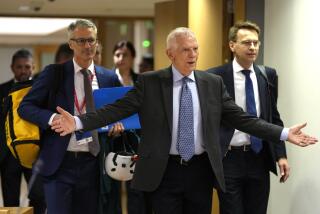Eurozone holds off on approving second bailout for Greece
Amid rising rancor and distrust, European finance officials held off Wednesday on approving a second bailout for Greece, saying the nation’s leaders had yet to fulfill all the requirements to receive the money.
The decision came despite a last-minute scramble by Athens and capped a day of escalating tension between Greece and its Eurozone partners, including unusually blunt remarks from top Greek officials, who accused other Europeans of trying to boot their country out of the Eurozone.
“There are many in the Eurozone who don’t want us anymore,” the Greek finance minister, Evangelos Venizelos, said at a meeting with the nation’s president, Karolos Papoulias.
After a conference call Wednesday evening, finance ministers of the 17 countries that use the euro said progress had been made in negotiations with Athens on a new, $170-billion bailout, but that a few issues still needed ironing out. They said an agreement on the rescue package could come Monday.
Still, the delay piles additional pressure on Greece as it seeks to avert a humiliating default next month that could roil global markets.
It also reflected the increasingly hard line adopted by fellow Eurozone countries. Officials of Germany, the Netherlands and other rich European states recently have accused Athens of shirking its obligations.
That has prompted Greek officials to lash back, including an angry outburst from Papoulias, Greece’s ceremonial president, that cited Germany’s finance minister, Wolfgang Schaeuble, by name.
“Who is Mr. Schaeuble to disparage Greece? Who are the Dutch? Who are the Finns? We always had the pride to defend not just our freedom, not just our country, but the freedom of Europe,” Papoulias declared.
The rising tension comes as new figures released Wednesday showed the Eurozone’s economic output contracting in the last quarter of 2011, a highly volatile period during which the big economies of Italy and Spain also looked vulnerable. Even powerhouse Germany saw its economy slow down in the final three months of 2011.
A second bailout for Greece, the epicenter of the debt crisis, was to have been at the top of the agenda at a gathering of Eurozone finance ministers scheduled for Wednesday. Officials called the meeting because they said they were encouraged by the Greek government’s approval of harsh new austerity policies and by ratification of those measures over the weekend by the country’s parliament despite protests and riots on the streets of Athens.
But the head of the finance ministers’ group abruptly canceled the meeting late Tuesday and arranged the conference call instead, issuing a terse statement that Greece had yet to fulfill all the conditions for a new rescue package.
Athens scrambled Wednesday to meet those demands. They included written pledges to maintain the austerity policies after elections in April and details of an additional $430 million in spending cuts.
“Substantial further progress has been made,” including “strong assurances provided by the leaders of the two coalition parties in Greece’s government,” said Jean-Claude Juncker, the prime minister of Luxembourg and president of the finance ministers’ group.
But more work was necessary on how to monitor Greece’s implementation of its austerity measures, he said, in an allusion to the failure of Athens to follow through on previous promises, such as mass layoffs of public-sector workers and privatization of state assets.
Greece is already on its knees after repeated rounds of austerity measures, and many of its citizens find Europe’s new demands both devastating and demeaning. The Greek economy shrank by nearly 7% last year, on top of contractions in at least each of the previous two years.
Still, Greek officials insist that their country’s future lies in remaining a member of the currency union.
“We do not have a choice between a pleasant or unpleasant option but a choice … between either unpleasant or even more unpleasant solutions,” Finance Minister Venizelos said.
More to Read
Start your day right
Sign up for Essential California for news, features and recommendations from the L.A. Times and beyond in your inbox six days a week.
You may occasionally receive promotional content from the Los Angeles Times.







